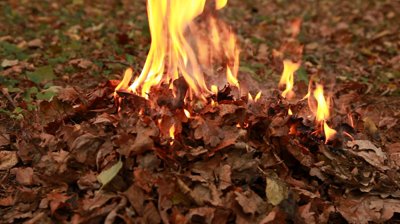Burn Leaves At 'Our' Risk!
burning-leaves

As winter begins to grip Bangalore and cold foggy mornings begin to greet us every day, the familiar acrid smell of burning leaves begins to permeate the air as we wend our way to work and school. Little bundles of leaves swept up by the roadside corporation sweeper as set alight by her just to make her job easier. Much easier to burn them than sweep them up into her basket or wheel barrow. It does not end there as she has to carry them further to put it all together with all the waste littering the road.
This open burning of leaves, is a widespread phenomenon across the city to get rid of fallen leaves in winter. Today Senior atmospheric scientists like Arnico Panday from ICIMOD ( International Centre for Mountain Development) in Kathmandu says this burning of leaves releases large amounts of soot, and particulate matter, aggravating air pollution. The sweepers and maalis in public parks across the city, have always been burning leaves in large heaps. They have been doing this for years as a habit. It is only by government intervention that this hazardous practice can be stopped.
Traditionally, burning of leaves in the winter has been done, in order to prevent the huge quantity of dry leaves from adding to the municipal solid waste stream. Think about the thousands of parks across Bangalore city where sweepers will be huddled around the burning leaves haviNg their morning cup of chai or coffee. This is going to be a difficult habit to break but they have to realise that breathing in the soot and particulate matter is carcinogenic for them. It is one of the reasons why many of them and many other Bangaloreans as well suffer from chronic respiratory tract diseases.
The Central Pollution Control Board (CPCB), in its soon-to-be published Source Apportionment Study, which pinpoints the sources and the amount of each air pollution component, has mentioned burning of leaves as a source of winter pollution everywhere in the country.
The Black Carbon released by the burning according to ICIMOD's research can have a direct effect on health. Inhaled black carbon has a greater effect on the lungs as it is emitted into the atmosphere as ultrafine particles smaller than 2.5 micrometres called PM 2.5 which can penetrate deep into peoples lungs.
The World Health Organization has recently recognised black carbon as a carcinogen. So why should we open ourselves to the risk of Cancer?
Drs Andrew N and Annika N say that small children are at grave risk. And all those joggers on the road or in parks who inhale more air in the morning are also greatly exposed to it, they say.
If that is the case and credible sources like the UN have confirmed the risk, why do we leave ourselves open to smoke and the burning of leaves and garbage? We need to make the city further aware of this unnecessary risk which can easily be handled by compost pits into which the leaves can be mulched.
There are always sustainable methods to get rid of leaves and burning them is definitely not one of them.



